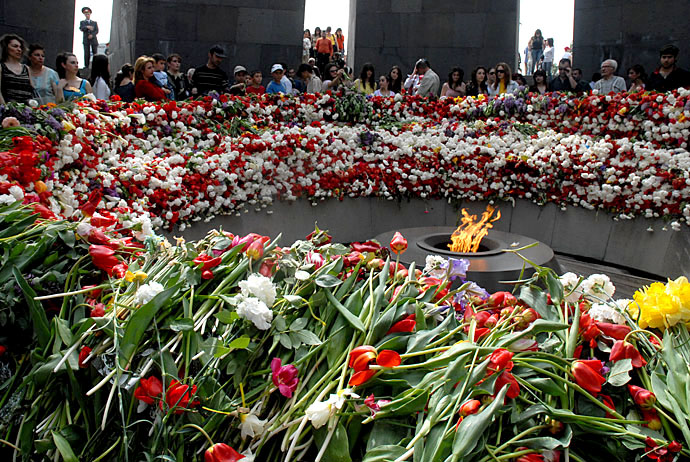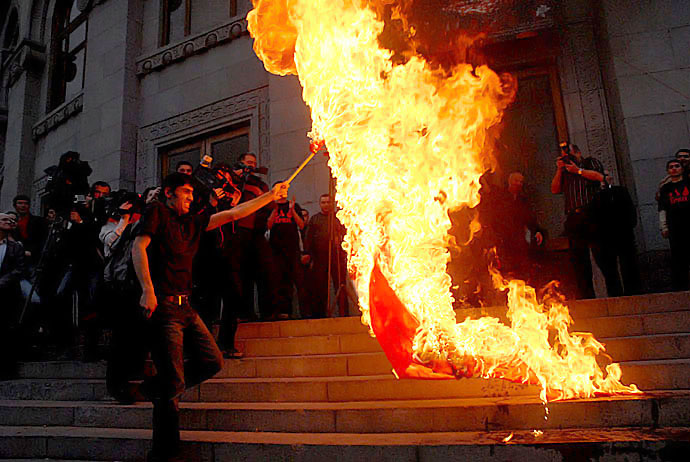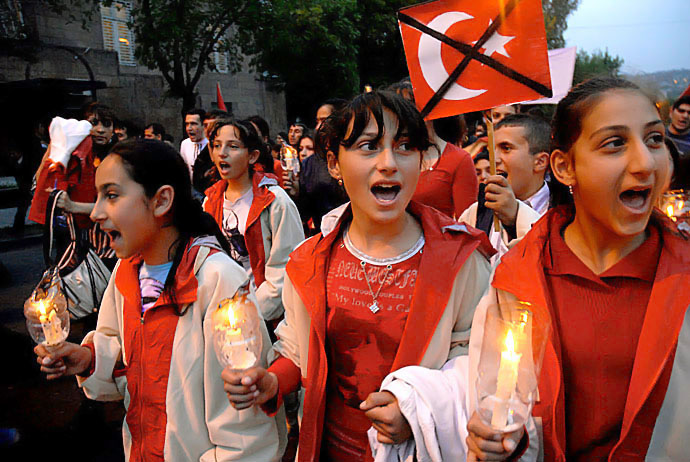
History has the unfortunate habit of repeating itself as Armenians know only too well. This is especially true when it comes to U.S. presidential elections. Without fail, candidates running for the White House promise to recognize the WWI massacre and deportation of as many as 1.5 million Armenians living in the then Ottoman Empire as genocide only to have them renege on such campaign promises when in office.
This time round, however, the large and influential Diaspora lobby in Washington had hoped things would be different with Barack Obama in power, and not least because of the inclusion of activists such as Samantha Power in his transition team. The arrival today of the U.S. president in Turkey, on the other hand, does not bode well. Of course, Armenians shouldn't be surprised. There are other far more pressing matters for Obama to concern himself with.
To begin with, sending out the right message from secular Turkey to the Islamic world is vital in order to repair the damage caused by his predecessor, George W. Bush. Moreover, the U.S. continues to need Turkey's help in Iraq and Afghanistan. Since the August war between Georgia and Russia, Turkey's potential role as a counterbalance to Moscow's influence in the South Caucasus has also become apparent.
When it comes to Armenia, the issue becomes especially complicated. While many in the Diaspora seek recognition of the genocide if only to punish Turkey as well as validate demands for territorial reparations, Armenia instead desparately wants the border with its historic foe opened. Closed during the height of the Nagorno Karabakh conflict, Armenian forces occupied 14 percent of Azerbaijan, Turkey's main ally in the region.
Effectively blockaded by both, most of Armenia's trade presently transits via Georgia and the August war with Russia effectively cut off its main access to the outside world. There are also hopes that normalizing relations between Armenia and Turkey will benefit regional stability and contribute to finding a peaceful solution to the long-running Armenian-Azeri conflict. More significantly, perhaps, a historical commission to examine the genocide will also be established.
This reality was not lost on newspapers such as the New York Times.
We have long criticized Turkey for its self-destructive denial of the World War I era mass killing of Armenians. But while Congress is again contemplating a resolution denouncing the genocide, it would do a lot more good for both Armenia and Turkey if it held back. Mr. Obama, who vowed in the presidential campaign to recognize the event as genocide, should also forbear. link
That the massacre and deportation of most of the Ottoman Empire's Armenian population constitutes genocide is hardly disputed, and not least because the events of 1915-17 were used as a case study by Polish lawyer Raphael Lemkin when he coined the term in 1943. Nevertheless, the precise number of those who perished is still unknown, as are some aspects of the actual events themselves, with some believing that comprehensive study is still necessary.

Photo: Armenian Revolutionary Federation -- Dashnaktsutyun (ARF-D) burn the Turkish flag, Yerevan, Republic of Armenia © Onnik Krikorian / Oneworld Multimedia 2008
Of course, it is not impossible that Obama will refer to the killings as genocide, but most independent observers consider that to be unlikely. This is especially true given the arrival tomorrow of Armenia's foreign minister in Istanbul to coincide with Obama's visit. Many suspect that the two events and their timing are more than coincidental, especially as April is also the month when Armenians worldwide remember the tragic events of 1915-17.
Meanwhile, although hundreds of thousands of Armenians will continue to visit the Genocide memorial in the Armenian capital, Yerevan, on 24 April, it is the Diaspora -- or at least those groups which claim they represent millions of ethnic Armenians living abroad -- who remain most opposed to any rapprochement. Somewhat Ironically, even local traditionally nationalist parties such as the Armenian Revolutionary Federation -- Dashnakstutyun (ARF-D) remain relatively silent on the matter.
Others simply consider that Armenia and Turkey might well be on their way to resolving outstanding grievances on their own. Coming to terms with the past matters most in Turkey and not the United States, they argue, and it is that fact alone which is likely to influence Obama's decision on whether to support such efforts rather than risk derailing them. However, along with Obama's endorsement of Turkey's European Union membership bid, it will disappoint many in the Armenian Diaspora.

Photo: Armenian Revolutionary Federation -- Dashnaktsutyun (ARF-D) youth protest Turkish denial of the Armenian Genocide, Yerevan, Republic of Armenia © Onnik Krikorian / Oneworld Multimedia 2008
Update
No sooner as most observers believed that Armenia and Turkey were close to establishing diplomatic relations without preconditions, the latest news is that the Armenian foreign ministerchose not to visit Istanbul as originally intended. The reason? Turkish relations with Armenia's other adversary in the region, Azerbaijan.
The Armenian Yerkir Media TV reports that Armenian Minister of Foreign Affairs, Edward Nalbandian, did not get on the Yerevan-Istanbul flight late this evening, after issuing a terse response to announcements made by Turkish President Gul and Turkish Prime Minister Erdogan that Turkey will not lift its blockade of Armenia unless Armenia fulfils Turkish preconditions regarding the Mountainous (Nagorno) Karabagh issue and the international recognition of the Armenian Genocide.
[...]
I think that the announcements that put forward preconditions to the establishment of Armenian-Turkish relations can be viewed as an attempt to fail the advances registered during the negotiations," concludes Foreign Minister Nalbandian.
The Armenian Foreign Ministry distributed Minister Nalbandian's response just before the Armavia flight from Yerevan to Istanbul, at 23:06.
[...]
Now, announcements by the Turkish Prime Minister and the Turkish President, resetting preconditions to the establishment of diplomatic relations with Armenia and to the lifting of the blockade have actually led the Armenia-Turkey negotiations into a rocky road or maybe even an impasse. link
The announcement comes after Azerbaijan's president, Ilham Aliyev, threatened last week to cut off gas supplies to Turkey. Whatever the reasons for the surprise move, however, news of what appears to be an insurmountable obstacle to the normalization of ties between Armenia and Turkey puts new pressure on Obama during his visit.
True, Turkey's strategic importance to the U.S. remains as crucial as ever, but if the main argument against passage of a resolution recognizing the genocide in the U.S. Congress, as well as regarding the wording of Obama's 24 April message, was that the two countries were close to resolving their own differences, it now no longer exists.
What will be interesting is whether the sudden change in Turkey's position will be touched upon in any press conference held with the U.S. president and whether he will privately remind Ankara that he can still allow Congress a free hand in deciding whether to pass the genocide resolution or not. As The Economist's Amberin Zaman recently wrote:
[The U.S.] should remind Turkey that the security card has its limits; the longer Turkey and Armenia remain at odds, the more likely it is that the genocide resolution will pass, and with it an opportunity to curb Russian influence and to bring calm and prosperity to the Caucasus." link
Update #2
The Armenian foreign minister eventually did travel to Turkey and there have been plenty of developments since. See the comments section below for updates.
End Update
Top Photo: Tsitsernakaberd Genocide Memorial, Yerevan, Republic of Armenia © Onnik Krikorian / Oneworld Multimedia 2008

The Independent's Robert Fisk also weighs in on the discussion regarding what U.S. President Barack Obama should do with regards to Armenia, Turkey and the Armenian Genocide.